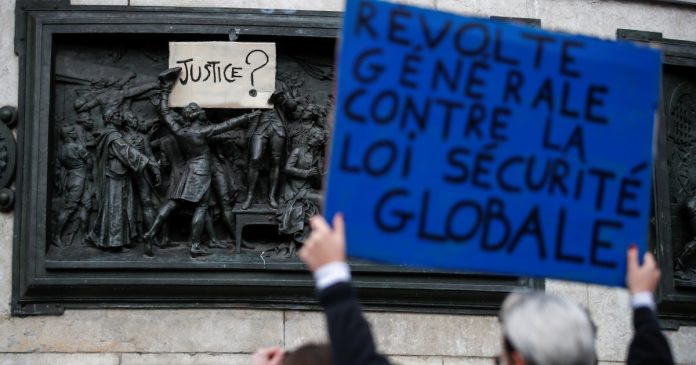[ad_1]
Amnesty condemns police arrests of people who attended mass demonstrations against controversial bill.
French authorities have used “illegal tactics” including arbitrary detentions to “crush protests and silence critics” of the proposed Global Security Bill, Amnesty International said on Monday.
If passed, the law would curb people’s ability to share images identifying police officers in the media and online and extend authorities’ surveillance powers.
Since November, thousands have protested against the plan and hundreds have been arrested in the demonstrations.
“People protesting against the dangerous Global Security Bill have been arrested and detained on spurious grounds,” said Marco Perolini, Amnesty International’s Europe researcher.
“The heavy-handed way in which French police have dealt with these protests only emphasises why scrutiny over policing is so necessary. This bill could prevent journalists from reporting on police violence, an extremely dangerous precedent to set.”
Perolini accused police of arresting peaceful protesters, describing behaviour by some officials as moves that came straight out of the “human rights violators’ playbook”.
“These dangerous practices pose a grave threat to the rights of people in France,” Perolini said.
‘Arbitrary arrests’
Amnesty highlighted 142 arrests in the French capital, Paris, on December 12, as problematic.
It said 124 of those arrested were put in pre-charge detention, and that in nearly 80 percent of those cases, protesters were not eventually prosecuted.
“Many of these protesters were arrested for non-violent crimes that are vaguely defined in French law; these include the crime of contempt against public officials, and participating in a group with a view to preparing violent acts,” the rights group said.
“Precisely because of the vague definition of these offences, there are insufficient grounds to justify many of the arrests and pre-charge detentions,” it added.
Amnesty said it had raised similar concerns regarding “arbitrary arrests” during France’s so-called yellow vest protests, which erupted in 2018, as well as protests against a COVID-19 lockdown last year.
The Global Security Bill, which will be voted on in the French Senate next month, has been widely seen as a rightward lurch by French President Emmanuel Macron.
But after the legislation was adopted by France’s National Assembly and the first protests against it took place, Macron’s La Republique En Marche (LREM) party pledged in November to “totally rewrite” Article 24 of the bill.
Critics of the bill argue it could stop people from exposing police brutality.
Macron is also under pressure over a planned law to regulate how Islam is practised in France, with the president on a path against what he has called “Islamist separatism”.
Some observers believe the anti-separatism bill unfairly targets Muslims, and is an attempt to win votes among right-wing citizens before the next election, in 2022.
Last week, France was downgraded from a “full democracy” to a “flawed democracy” in The Economist’s Global Democracy Index 2020.
[ad_2]
Source link











